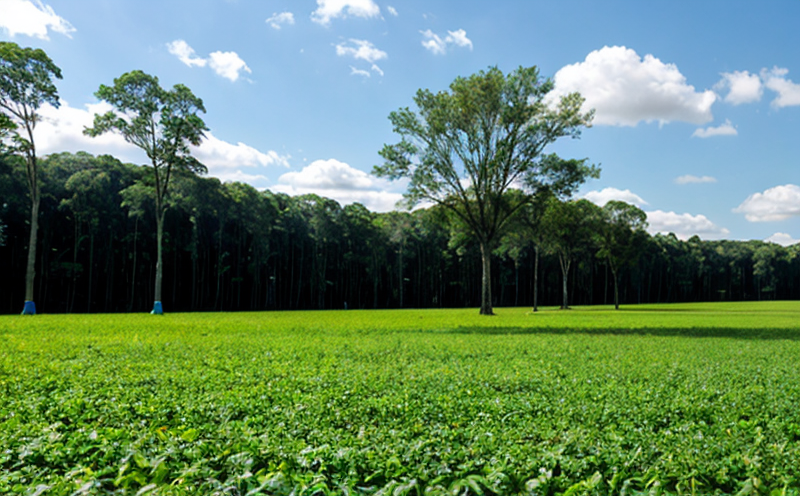Sustainability Benchmarking of Consumer Products
The growing demand for sustainable products has driven a shift towards more responsible manufacturing practices. Sustainability benchmarking is an essential tool that enables companies to evaluate their product's environmental impact and compare it against industry standards or competitors. This service involves comprehensive testing to assess the sustainability aspects of consumer products, providing actionable insights for continuous improvement.
Sustainability benchmarking focuses on several key areas including energy consumption during manufacturing, water usage throughout the supply chain, waste generation at various stages, and recyclability post-consumer use. By quantifying these factors, companies can identify inefficiencies and opportunities to innovate more eco-friendly solutions.
Our approach starts with a thorough review of the product's lifecycle using methodologies like Life Cycle Assessment (LCA) as per ISO 14040/14044 standards. This analysis helps in understanding how different stages contribute to the overall environmental footprint. We then conduct specific tests such as material composition analysis, water efficiency measurement, and greenhouse gas emissions assessment.
For instance, when testing for energy consumption during manufacturing, we simulate real-world production conditions using advanced sensors and meters that comply with international standards like ASTM D7192 or IEC 62301. Similarly, in measuring water usage, our calibrated equipment adheres to EN 14848 ensuring accuracy and reliability.
The results from these tests form the basis of a detailed report which includes comparative analyses against benchmark targets set by industry leaders or regulatory bodies. This helps businesses not only meet but exceed sustainability goals while also gaining valuable insights into market trends and consumer preferences.
Implementing sustainability benchmarks is crucial for several reasons beyond just meeting legal requirements; it enhances brand reputation, boosts customer trust, and opens up new markets where sustainable products are valued highly. Companies that demonstrate leadership in this area often see increased sales and stronger loyalty from environmentally conscious consumers.
In conclusion, sustainability benchmarking offers a holistic view of a product's environmental impact, paving the way for informed decision-making processes aimed at reducing negative impacts on our planet. It is more than just compliance; it's about proactive stewardship towards creating a greener future.
Applied Standards
In conducting sustainability benchmarking, we adhere strictly to internationally recognized standards and guidelines which ensure the accuracy and reliability of our findings. These include:
- ISO 14040/14044 - Life Cycle Assessment
- ASTM D7192 - Environmental Management Systems for Manufacturing Industries
- IEC 62301 - Energy Efficiency Labeling of Products
- EN 14848 - Water Efficiency Labelling and Standards
- ISO/TS 15986 - Green Building Assessment
- IEC PAS 2067 - Sustainability Performance of Products
- ASTM E2432 - Method for Measuring Recyclability of Plastics Packaging
- EN 15804 - Environmental Product Declaration
These standards provide a robust framework that guides us in evaluating and reporting the sustainability aspects of consumer products accurately.
Why Choose This Test
Selecting our sustainability benchmarking service ensures several benefits for your organization:
- Compliance Assurance: Stay ahead of regulatory changes and ensure compliance with global standards.
- Informed Decision-Making: Gain deep insights into your product's environmental impact, guiding strategic initiatives effectively.
- Enhanced Reputation: Demonstrate commitment to sustainability, attracting eco-conscious consumers and stakeholders alike.
- Cost Savings: Identify areas where improvements can lead to significant reductions in resource use and operational costs.
- Innovation Opportunities: Understand what differentiates your product from competitors, fostering innovation and differentiation strategies.
- Market Leadership: Establish yourself as a leader in sustainability practices, opening doors to lucrative markets and partnerships.
Our rigorous testing process combined with expert interpretation ensures that you receive reliable data and actionable recommendations tailored specifically for your business needs.
Competitive Advantage and Market Impact
The global trend towards sustainability is reshaping consumer behavior, making it imperative for businesses to align their offerings with these changing preferences. By leveraging our sustainability benchmarking service, companies can harness this shift to gain significant competitive advantages:
- Customer Preference Alignment: Cater specifically to the demands of environmentally aware customers.
- Increased Market Share: Attract and retain more environmentally conscious consumers who are willing to pay a premium for sustainable products.
- Premium Pricing Opportunities: Position your product as superior, potentially commanding higher prices in niche markets.
- Sales Growth: Expand into new geographies where sustainability is increasingly important to local regulations and consumer expectations.
- Better Supplier Relationships: Work with suppliers who share the same values, ensuring consistent quality and ethical practices across the supply chain.
- Promote Corporate Social Responsibility (CSR): Showcase your company's commitment to sustainability, enhancing your brand image and stakeholder relations.
Moreover, integrating sustainable practices into your business model can foster long-term resilience against market fluctuations and regulatory pressures. It also positions you as a responsible corporate citizen, contributing positively to society and the environment.





